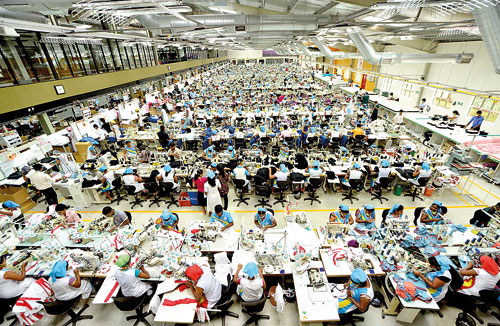EPF: Private sector management without political interference
View(s):While a BT email poll on the proposed private management of the Employees Provident Fund (EPF) revealed mixed views from the public, most respondents said that even if private management is entertained it shouldn’t be politicised. Last month, unions representing both employers and workers took a cautious approach to the question of EPF reforms with extra focus on investments in the stock market, saying employers and workers should have a bigger say in the management of these funds.

File picture of workers at a garment factory. Unions are demanding a bigger say in how the EPF is managed.
Some years, the EPF drew a lot of flak after it was revealed that it had invested in many loss-accruing companies in the stock market. More than 90 per cent of the investments are in secure government treasury bills and bonds but these are low return, hence the need to increase investments in other products with a higher return. The results of the BT poll, which this time was not down on the street, is published on page 1 of the Business Times.
Commenting on the proposed private sector management, one respondent said that this would be detrimental on the long run.
“It’s debatable if such a move can add any value (alpha) to the performance. If at all if there were real value addition as a result of a private fund manager, in the management of the EPF operations, the additional returns will be siphoned off as management fees and management expenses,” he said, adding that most pension funds have an asset allocation of 40 per cent equity and 60 per cent fixed income limiting the exposure to volatility.
This respondent also pointed out that in no country does the Central Bank manage the key pension funds. “Only we do in Sri Lanka and due to resource constraints the pension fund is managed by the Central Bank. This is a conflict of interest,” he said. While the Central Bank must be the custodian of the fund, the fund operation (trading, risk management, asset allocation), related yield management work has to be managed by a separate arm of which there must be a representation of the membership.
Responding to the query on whether or not the fund should be taxed annually, another respondent said that this “is outright wrong.”
“This is not some commercialised operation run for profit as do mutual funds. The EPF mandate is different from other fund operations i.e. mutual funds. The proper approach is upon a member redeeming the funds at retirement, that at this stage based on a laddered formula, tax must be levied,” he said.
Other comments:
- Handing over to a private fund manager is too much of a risk. Perhaps a small proportion such as 5-10 per cent of the fund could be invested in such schemes like the stock market. Life has taught us not to be ambitious about core investments. Small but secure returns are welcome.
- Private management is okay as long as it’s independent.
- It should be managed by an independent board of directors without political appointees.
- Private management is ok provided it is managed by the employers and trade unions of contributing companies. Since it is private sector money, it should be in the hands of the private sector stakeholders.
- On the question of annually taxing the EPF:
- If this happens, some of us will be taxed twice that way.
- Pension incomes are subject to tax in other countries as well but not like this.
- In the US for example contributions themselves are tax free. That is to say the taxable salary is after deduction. In Sri Lanka while the employer contribution is free, the employee contribution (8 per cent) is taxable as PAYE tax is charged on the gross salary. This is wrong.
- In Sri Lanka not only is the salary taxed but now income from the EPF is also taxed. Both of this is wrong.
- There is a tax when the money is paid out in other countries. If there is a 10 per cent or similar low tax when the money is paid at 55 years, this is fair. After that people will pay normal tax on the capital such as interest income or whatever.
- The problem in Sri Lanka is that private sector workers have long been driven by politically aligned unions usually controlled by politicians who get salaries from taxes, and who have no real interest in the welfare of the private sector workers and see them as second class citizens. Key union leaders themselves may be state workers who benefit from the system.
- Many union leaders have a mistaken belief that the government is ‘good’ based on the British period government structure. This no longer applies to Sri Lanka as there are no permanent secretaries and the state machinery is subject to political corruption and misuse and state officials can no longer resist political interference.
- As a result in Sri Lanka there is massive discrimination in the entire taxation structure from cars to salaries to benefits. State workers get all kinds of benefits when they retire such as the vehicles they used as a kind of ex-gratia payment, while private workers are taxed heavily.
- Before taxing the EPF, a similar non-contributory fund must be established for the state workers. This will bring the true cost of state workers into the budget and put pressure to cut down the bloated state sector.
- The rate of taxation must be low and limited to when the money is taken out.


